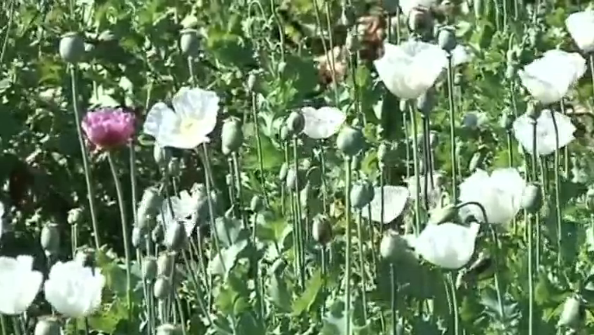
KAYAH STATE, Myanmar (Reuters) — At a remote farm about two hours away from Koikaw, capital of the northern Kayah State of Myanmar, farmers scrape out raw opium from the poppies they’ve grown.
They are part of an illicit drug trade in the Mekong region. Myanmar, Laos and Thailand make up the so-called Golden Triangle, which churns out a quarter of the world’s opium.
Myanmar produced an estimated 647 tons of opium in 2015, second only to Afghanistan, the United Nations Office on Drugs and Crime (UNODC) said in a report last year.
The illicit industry is worth billions of dollars, and is driven by poverty, conflict and Chinese demand.
“We grow poppies, paddy and corn but the income from the poppy is the best,” a 40-year old unidentified farmer said.
The UNODC has urged Myanmar to focus efforts on crop substitution that produces an alternative income for farmers, instead of simply trying to ban it.
“We’re hoping in the UNODC that the whole issue about eradication of drugs is realized as not working, whoever is eradicating. It has to be alternative development. There must be another substitute income happening for the farmers,” said UNODC Countryman Troels Vester, adding: “Farmers are not doing this because they’re criminals, they’re doing this to survive.”
The UNODC said it was working closely with poppy farmers in Shan State and introducing alternative crops such as coffee planting as a pilot project.
Narcotics pose a headache for leader Aung San Suu Kyi. The military retains formal control over the ministries of defense, border affairs and home affairs – all crucial to counter-narcotics efforts. Most drugs are produced in border areas controlled by ethnic rebel armies or by the Myanmar military and allied militias.
Myanmar Anti Narcotics Association Chairman, Sein Win, said the country would not be able to eradicate the problem alone.
“There was no support from the outside world and sanctions during military regime. That’s why the government had tried to, within their abilities, introduce agriculture and livestock substitution. But frankly speaking, it was not effective. I hope there will be better international support from international NGOs and G-to-G (government to government) planned, as this is a new government and our country is on the right path to democracy,” he said.
The UNODC estimates that Southeast Asia’s trade in heroin and methamphetamine was worth $31 billion in 2013.







